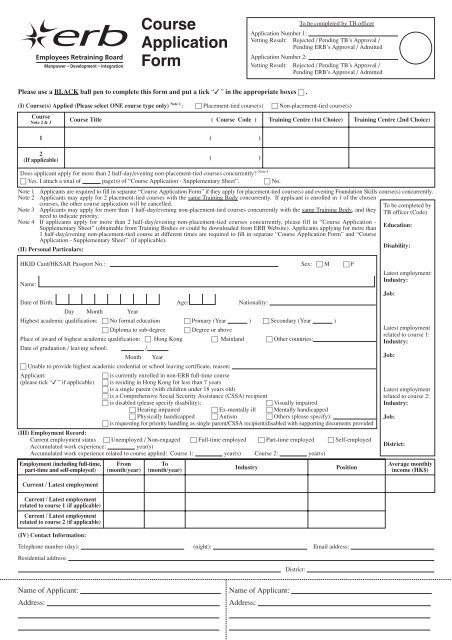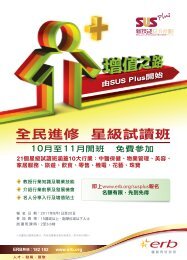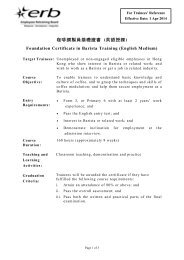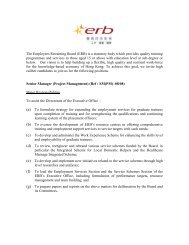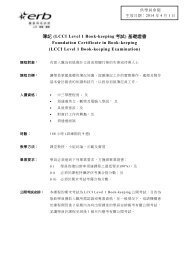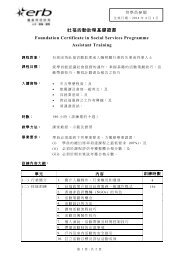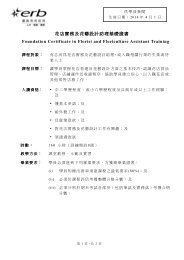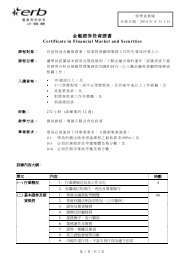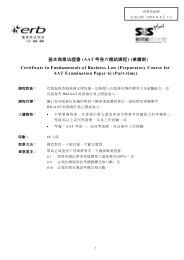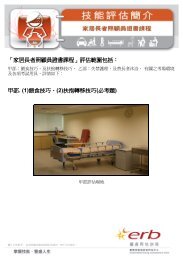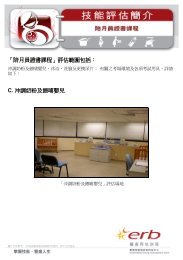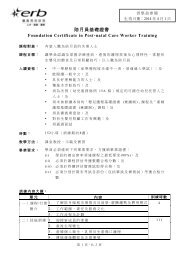Course Application Form
Course Application Form
Course Application Form
Create successful ePaper yourself
Turn your PDF publications into a flip-book with our unique Google optimized e-Paper software.
To be completed by TB officer and given to applicantsYour application for the following course(s) has been received. You will be informed of the application result shortly.Name of Applicant:Date of <strong>Application</strong>: Placement-tied course(s)<strong>Course</strong> <strong>Course</strong> Code1 Non-placement-tied course(s)<strong>Course</strong> <strong>Course</strong> Code1(Normal Subsidised Fee)(Highly Subsidised Fee)<strong>Course</strong> Fee#22(Normal Subsidised Fee)(Highly Subsidised Fee)Training Body Officer (Name): Chop of Training Body :Date:# Applicable to half-day/evening non-placement-tied courses only. <strong>Course</strong> fee payable by the applicant is based on the amount stipulated at the time of application.Please refer to paragraphs 25 to 27 of <strong>Application</strong> Guidelines about the course fees of half-day/evening non-placement-tied courses.<strong>Application</strong> GuidelinesEligibility1. General Admission Criteria:a) eligible employees of HKSAR (i.e. those with no restrictions of stay including permanent residents of HKSAR and new arrivals); andb) aged 15 or above; andc) education attainment of sub-degree or below; andd) any other admission requirements specified for individual courses, including job specific requirements stipulated by law or for licensingpurposes.2. Students who are engaged in full-time non-ERB education programmes are not eligible for courses of the Employees Retraining Board (ERB).3. Non-engaged youths aged 15 to 17 with secondary education level or below should apply for the “Youth Training Programme” courses.Applicants who are 18 to 20 years old with secondary education level or below can apply for either the “Youth Training Programme” coursesor other training courses provided by the ERB according to their own interests and training needs.4. Placement-tied training courses are provided for the unemployed and non-engaged only. Applicants shall demonstrate strong inclination foremployment and interest in the subject area. Training Bodies shall ascertain the job motivation of applicants during admission interviews.5. Applicants of half-day/evening non-placement-tied courses shall also demonstrate strong inclination for employment. Training Bodies mayconduct admission interviews to ascertain the job motivation of applicants if necessary.6. Applicants will be assessed according to the general admission criteria and course entry requirements, including interviews and tests (ifapplicable), before they are put on the waiting list for class enrolment.7. Enrolled trainees of placement-tied course should report to the respective Training Bodies of any changes in their employment status (e.g. frombeing unemployed to being engaged in full-time or part-time employment, or become self-employed) prior to class commencement or whileattending the courses. The ERB will re-consider the eligibility of the trainees for attending the courses and/or receiving retraining allowances.Failure to do so may lead to infringement of Section 25 of the Employees Retraining Ordinance. Person found to have committed the offence isliable to a fine of $20,000. Besides, under the Theft Ordinance, Cap. 210 of the Laws of Hong Kong, any person obtaining pecuniaryadvantage by deception in benefit to himself/herself or another person is liable to conviction of imprisonment for a maximum of 10 years.
<strong>Application</strong> Procedures and Supporting Documents8. Applicants shall apply, in person or by post, with a duly completed “<strong>Course</strong> <strong>Application</strong> <strong>Form</strong>” and provide the following supporting documents.<strong>Course</strong> applications by post should be supplemented by copies of supporting documents. Training Bodies will verify applicants’ information andsupporting documents prior to class commencement. <strong>Course</strong> applications may not be accepted if applicants fail to provide the documents required.Placement-tied courses(i) Proof of identity of eligible employee of HKSAR Note 1 Hong Kong Permanent Identity Card or Hong Kong SpecialAdministrative Region (HKSAR) Passport, or Hong Kong Identity Card, with Document of Identity for VisaPurpose and/or other travel documents.(ii) Proof of academic qualification Applicants should submit documents to prove their highestacademic qualification, e.g. letter or certificate issued by theschool/institution concerned. Note 2(iii) School leaving certification (if applicable) Applicants who left school within the last 6 months shouldsupply a Letter of Withdrawal/Leaving Certificate or otherdocumentary proof issued by the school concerned.(iv) Duly signed “Consent <strong>Form</strong> for Collection of Income Proof”Non-placement-tied courses(i) Proof of identity of eligible employee of HKSAR Note 1 Hong Kong Permanent Identity Card or Hong Kong SpecialAdministrative Region (HKSAR) Passport, or Hong Kong Identity Card, with Document of Identity for VisaPurpose and/or other travel documents.(ii) Proof of academic qualification Applicants should submit documents to prove their highestacademic qualification, e.g. letter or certificate issued by theschool/institution concerned. Note 2(iii) School leaving certification (if applicable) Applicants who left school within the last 6 months shouldsupply a Letter of Withdrawal/Leaving Certificate or otherdocumentary proof issued by the school concerned.(iv) Duly signed “Consent <strong>Form</strong> for Collection of Income Proof”(except for applicants with monthly income of $19,501 or above)(v) Proof of work experience or professional qualification/certification(if applicable) Applicants should refer to individual course outlines forspecific work/professional qualification requirement(s) andprovide proof as appropriate. Examples of proof of workexperience include: letter from employer, employmentcontract, work/service agreement, staff identification card,valid industry-specific registration, permit, salary statements,MPF statements, Smart Helper Card, etc.Note 1 The ERB requires trainees to provide proof of eligible employee of HKSAR as specified above (i.e. Hong Kong Permanent Identity Card/HKSAR Passport,or Hong Kong Identity Card, with Document of Identity for Visa Purpose and/or other travel documents) during classes for verification of their identities.Note 2 Highest academic qualification refers to the highest level of full curriculum study that the applicant has attended at a school (even if theapplicant has not completed the study or fails to provide proof of academic qualification). Applicants are required to provide sufficientdocumentary proof and reasonable explanation should they request to amend their highest academic qualification declared in past courseapplication(s). Applicants with non-local academic qualification may reckon their equivalent local academic qualification based on thenumber of years of school education received. For example, if an applicant has received formal school education for more than 9 years in theMainland, his/her academic qualification may be reckoned as equivalent to above <strong>Form</strong> 3.9. Should applicants fail to provide proof of highest education attainment at the time of their first course application, they may declare such bystating and signing on the “<strong>Course</strong> <strong>Application</strong> <strong>Form</strong>”, confirming that all information reported is correct and complete. Should applicantswish to amend the highest education attainment previously reported, such applications must be supported by documentary proof with validreasons substantiating such change. Failing to do so, ERB will not approve such applications, especially with those applying for downwardadjustment of highest education attainment, as applicants have declared in writing in previous course applications that the information given iscorrect and complete. Further declaration to override any past declaration would also be deemed invalid.10. Priority will be given to the disabled and people recovered from work injuries and occupational diseases, single parents and ComprehensiveSocial Security Assistance (CSSA) recipients, provided that sufficient and valid supporting documents can be supplied.Restrictions on <strong>Application</strong> and Enrolment11. To cater for applicants’ training needs, applicants can opt for either of the following arrangements:(i) to apply for 2 placement-tied courses concurrently with the same Training Body; or(ii) to apply for and enrol in more than 1 half-day/evening non-placement-tied courses concurrently with the same Training Body.Applicants can only choose either one of the above arrangements, with the exception of enrolling in a full-time placement-tied training course whileconcurrently enrolling in evening Foundation Skills training (i.e. Workplace Languages, Business Numeracy and IT <strong>Application</strong>s) courses, and vice-versa.12.(i)(ii)Placement-tied coursesEligible applicants who are unemployed and non-engaged are (i)allowed to attend no more than 2 full-time placement-tied courseswithin 1 year (from the date of current application to thecommencement date of the first full-time placement-tied courseenrolled within the past 12 months, inclusive of any enrolled butno show, or low attendance cases).For applicants applying for 2 full-time placement-tied courses, ifthey are enrolled in one of the courses, the other course applicationwill be cancelled accordingly. Applicants are not allowed to enrolin 2 placement-tied courses concurrently.(iii) Trainees of placement-tied courses (including those who fail to completethe courses) are not allowed to apply for another placement-tied course untilthe specified placement follow-up period has lapsed. Please make enquiriesto Training Bodies for the placement periods of individual courses.(iv) Applicants are not allowed to retake courses or take courses atsimilar or lower level of competency in the same disciplines as thecourses previously enrolled in.Non-placement-tied coursesEligible applicants are allowed to apply for (including courseapplications made on or before 31 March 2014 and currently on thewaiting list) and attend (from the date of current application to thecommencement date of the first half-day/evening non-placementtiedcourse enrolled within the past 12 months, inclusive of anyenrolled but no show, or low attendance cases) no more than 150hours of half-day/evening non-placement-tied courses within 1 year.(ii) Applicants applying for more than 1 half-day/evening nonplacement-tiedcourse are required to indicate their priority forapplications made concurrently. If the total course hours of allapplications exceed 150 hours, Training Bodies will accept courseapplications based on the dates of application first, and then on thepriority indicated by applicants. All course applications exceeding150 hours will not be accepted. Once accepted, applicants couldnot change their priority of accepted course applications.(iii) On condition that there is no clash of training schedules, applicantsare allowed to attend more than 1 half-day/evening nonplacement-tiedcourse concurrently.(iv) Applicants are not allowed to retake courses or to take courses at similar orlower level of competency in the same disciplines as the coursespreviously enrolled in (e.g. those completed the “Foundation Certificate inWord Processing II (Part-time)” is not allowed to take the “FoundationCertificate in Word Processing I (Part-time)”), including the “SkillsUpgrading Scheme” courses. Applicants are allowed to retake “SkillsUpgrading Scheme Plus” courses which they completed 4 years ago(from the date of current application to the commencement date of thecourses taken), including the “Skills Upgrading Scheme” courses.13. Eligible trainees are only allowed to enrol in 1 “Youth Training Programme” course.14. Please make enquiries to Training Bodies for details of restrictions on application and enrolment of individual courses.Cancellation of <strong>Application</strong>15. Applicants are advised to consider their course applications carefully. Cancellation of application should be made in person or in writing to theTraining Bodies concerned.
16. If the employment status of applicants have changed to be employed, applicants will lose the eligibility for enrolment in placement-tied courses. They willneed to make new course applications if they apply for the same courses again in future.17. <strong>Course</strong> applications will be cancelled upon applicant’s rejection of a total of 3 offers for enrolment in respect of all course applications. (If anapplicant concurrently applies for 2 placement-tied courses, the rejection of 3 offers for enrolment will be the sum of rejection of enrolment inrespect of both course applications. If an applicant concurrently applies for more than 1 non-placement-tied course, the rejection of 3 offers forenrolment will be the sum of rejection of enrolment in respect of all course applications.) Applicants will need to submit new courseapplications if they apply for the same courses again in future.18. Once enrolled, trainees should cancel course applications in person or in writing to the Training Bodies concerned no less than 3 working days prior tothe date of course commencement if they cannot attend the course. Failure to do so will result in trainees being deemed “No Show” and they will not beallowed to enrol in the same courses, or courses at similar or lower level of competency in the same discipline. No late cancellation will be accepted.19. Trainees who have enrolled in half-day/evening courses shall cancel course applications in person or in writing to the Training Bodies concernedno less than 3 working days prior to the date of course commencement if they cannot attend the course, and the paid course fee will be refunded.Failure to do so will result in the trainees being deemed “No Show” and they will not be allowed to enrol in the same courses, or courses atsimilar or lower level of competency in the same discipline, and the paid course fee will not be refunded. No late cancellation will be accepted.Award of Certificate20. Trainees should attain an attendance rate of 80% before they can sit for final assessment (including written examination and practical skillsassessment). Trainees will be awarded certificates after fulfilling the graduation requirements (including attainment of attendance of generally80% or above, after adjustment for sessions of late arrivals, early departures, sick leave and absence by other reasons; and passing of courseassessments). Certificates will not be re-issued under normal circumstances.Retraining Allowance21. Trainees of full-time placement-tied courses with course duration of 7 days or more are eligible to apply for retraining allowance Note 3 . Thearrangement with effect from 1 April 2014 is stipulated below:<strong>Course</strong>s“Youth Training Programme” <strong>Course</strong>sPlacement-tied “Certificate” or “Diploma” <strong>Course</strong>sTraineesAll eligible traineesAll eligible traineesRetraining allowance per day$30$70Placement-tied “Foundation Certificate” <strong>Course</strong>s All trainees aged 30 or above and with educationattainment of F.3 or below$153.8Other eligible trainees$70Note 3 Full-time placement-tied courses are conducted in mixed-mode (i.e. training sessions include full-day sessions (8 hours/day) and half-day sessions (4 hours/day)).The maximum retraining allowance trainees are eligible to receive for the course is computed based on the number of full-day training sessions only.Eligibility for Retraining Allowance22. To be eligible for retraining allowance, trainees have to attain an attendance rate of at least 80%. The calculation of attendance is based on:(i) the actual number of training sessions attended (after adjustment for sessions of late arrivals and early departures); and(ii) approved sick leave (not exceeding 20% of the total number of training sessions) substantiated by certificates issued by Hong KongRegistered Medical Practitioners, Registered Chinese Medicine Practitioners and Registered Dentists.The exact amount of retraining allowance to be disbursed is calculated on the basis of the actual number of training sessions attended and issubject to the maximum amount stipulated per training course.23. Details on the eligibility for and disbursement of retraining allowance for the “Youth Training Programme” courses and the placement-tiedcourses for persons with disablities and persons recovered from work injuries can be obtained from the Training Bodies concerned.24. Trainees can be disbursed retraining allowance for a maximum of 2 times per year or 4 times within 3 years (from the commencement date ofthe first course taken).<strong>Course</strong> Fee (applicable to half-day/evening courses only)Payment Procedures25. Training Bodies are responsible for processing course applications and informing applicants of their results. Training Bodies concerned shallinform successful applicants of the course commencement date, course fee and payment method. <strong>Course</strong> fee payable by the applicant is basedon the amount stipulated at the time of application. Under normal circumstances, fees paid are not refundable.<strong>Application</strong> for <strong>Course</strong> Fee Waiver/Payment of “Highly Subsidised Fee”26. Training Bodies shall provide applicants with details on applying for course fee waiver/payment of “Highly Subsidised Fee”. Upon receipt ofnotification of admission and prior to class commencement, trainees shall apply for course fee waiver/payment of “Highly Subsidised Fee” and/orpay the relevant course fee. Trainees may apply for course fee waiver/payment of “Highly Subsidised Fee” under the following conditions:Type of applicationIncome level<strong>Course</strong> fee waiverNil/low income (monthly income Note 4 of $9,000 or below)Payment of “Highly Subsidised Fee”Monthly income Note 4 between $9,001 and $19,500Note 4 Income denotes wages and salary through employment (including being employed and self employed), net business income and pension. Incomefrom employment and self-employment includes basic pay, overtime pay, bonus, commissions and allowance(s), etc, with the deduction of 5%contributions to MPF/ORSO. Bonus, double pay, gratuity, etc. should be taken into account in average over the relevant period of the employment.27. Trainees intending to apply for course fee waiver/payment of “Highly Subsidised Fee” have to provide the following supporting documents tothe Training Bodies. At the time of such application, trainees with income shall provide any one of documents (i) to (iv) below Note 5 , traineeswith nil income shall provide either document (v) or (vi):Trainees with income(i) payroll slip of any of the 3 months before course commencement (counted from the month of course commencement) Note 6 ; or(ii) certification letter of salary from current employer; the salary shall be any of the 3 months before course commencement (counted fromthe month of course commencement) Note 6 ; or(iii) bank passbook/statement showing payroll records of any of the 3 months before course commencement (counted from the month ofcourse commencement) Note 6 ; or(iv) statutory declaration statement administered by the Home Affairs Department declaring trainee’s latest month income level at the time ofdeclaration made. The stipulated month of income shall be any of the 3 months before course commencement (counted from the month ofcourse commencement); orTrainees without income(v) documents issued by the Social Welfare Department regarding Comprehensive Social Security Assistance (CSSA) Scheme (either “Notice ofConsent on <strong>Application</strong>” or “Certificate of CSSA Recipients (for Medical Waivers)” is acceptable), indicating that trainee’s receipt ofComprehensive Social Security Assistance (CSSA) is still valid on the date of course commencement (Note: This document is not applicable toCSSA recipients with income, CSSA recipients with income are required to submit one of the documents listed in (i) to (iv) above; or(vi) trainees with nil income could select “Declaration by trainee” as stated in the form of “<strong>Application</strong> for <strong>Course</strong> Fee Waiver/HighlySubsidised Fee”, so as to indicate that the trainee has nil income as at the time of declaration.Note 5 If a trainee attended a course that commenced on or after 1 April 2013 and had successfully been approved for course fee waiver or paymentof “Highly Subsidised Fee”, he/she may opt not to provide income proof for application for course fee waiver or payment of “HighlySubsidised Fee” for the current course admitted. However, his/her income level (as stipulated in paragraph 26) at the time of the currentcourse admitted and at the time of the last course attended (only applicable to the course from which the trainee had submitted a valid proofwithin the past year) should be the same. Please make enquiries to Training Bodies for details.Note 6 For example, if the course commences in April 2014, income proof from the month of February, March or April 2014 shall be acceptable.
Trainees with Low Attendance RateTrainees with Attendance Rate Below 80%28. Trainees (except for those who paid “Normal Subsidised Fee”) must attain a minimum attendance rate of 80% for courses enrolled. Shouldtrainees fail to attain the required attendance:Trainees of placement-tied courses(i) For trainees who have failed to attain therequired attendance for the first time (forcourse applications dated on or after 1 April2011): trainees will be prohibited from takingERB courses for 1 year (from the date ofcommencement of the concerned course);(ii) For trainees who have failed to attain therequired attendance for the second time ormore (for course applications dated on or after1 April 2011): trainees will be prohibited from taking ERBcourses for 3 years (from the date ofcommencement of the concerned course).Special Circumstances29. In the event that applicants fail to attain an 80% attendance due to illness/accident/hospitalisation, the ERB may consider waiving the demandfor recovery of course fee or prohibition from course enrolment. Trainees concerned have to report the case to the Training Bodies and providemedical certificate(s) issued by Hong Kong registered medical practitioners as soon as possible. The ERB has the discretion to approve orreject applications for waiver of outstanding course fee or prohibition from course enrolment.Fraud Prevention Measures30. The ERB will sample check the education attainment, employment status, mode of education and/or income level of applicants or trainees toverify the information they submitted. Any person who to his/her knowledge supplies false information or cannot meet the relevant requirementsmay be disqualified from attending the training course(s) and/or obtaining the course fee waiver, paying the “Highly Subsidised Fee” and/orreceiving the retraining allowance, and he/she has to pay back the concerned course fees, the cost of course and/or return the retraining allowanceto the ERB. The ERB also reserves the right to report the cases to the law enforcement Government department(s) for investigation and to takefurther legal actions. In accordance with Section 25 of the Employees Retraining Ordinance, any person who is found to have committed theoffence is liable to a fine of $20,000. Under the Theft Ordinance, Cap. 210 of the Laws of Hong Kong, any person who obtains pecuniaryadvantage by deception, in benefit to himself/herself or another person, is liable to conviction of imprisonment for a maximum of 10 years.31. For trainee who is found to have supplied false information in order to enrol in ERB courses or to receive a higher level of retrainingallowance, in the absence of a legitimate defense,For trainee who is found to have supplied false information in order to enrol in ERB courses(i) he/she is required to pay back the concerned course fees/the cost of course and/or return the retraining allowance to the ERB.(ii) for trainee who has committed the act for the first time, if he/she returns the concerned fee and/or allowance, he/she will be prohibitedfrom taking ERB courses for 3 months. If he/she fails to return the concerned fee and/or allowance, he/she will be prohibited from takingERB courses for 1 year. Prohibition period shall be effective from the date the recovery notice is issued to the trainee.(iii) for trainee who has committed the act for the second time, if he/she returns the concerned fee and/or allowance, he/she will be prohibitedfrom taking ERB courses for 1 year. If he/she fails to return the concerned fee and/or allowance, he/she will be prohibited from takingERB courses for 2 years. Prohibition period shall be effective from the date the recovery notice is issued to the trainee.(iv) for trainee who has committed the act over 2 times, such case will be reported to the Hong Kong Police Force.For trainee who is found to have supplied false information in order to receive a higher level of retraining allowance(i) he/she is required to pay back the difference of the concerned retraining allowance to the ERB.(ii) if he/she returns the difference of the concerned retraining allowance, he/she will be prohibited from taking ERB courses for 3 months. Ifhe/she fails to return the concerned retraining allowance, he/she will be prohibited from taking ERB courses for 1 year. Prohibitionperiod shall be effective from the date the recovery notice is issued to the concerned trainee.32. The ERB will carry out income surveillance each year. Trainees may be asked to provide income proof at the request of the ERB for thispurpose. In this connection, trainees are required to retain the income proof(s) (as stipulated in (i) to (iv) of paragraph 27) relating to theconcerned course enrolment(s) for 3 fiscal years (a fiscal year represents the period from April of a year from which trainees had enrolled in acourse to March of the following year). In addition, the ERB will request trainees to provide “Income Details” issued by the Inland RevenueDepartment for verification. In case a trainee is found to have obtained course fee waiver/paid the “Highly Subsidised Fee” by supplying falseincome information, the ERB will take the following actions:(i)request the trainee to pay back the course fee concerned; andTrainees of non-placement-tied courses(except for trainees who paid the “Normal Subsidised Fee”)They will have to pay an amount (in addition to the originally settled course fee, if any)equivalent to the “Highly Subsidised Fee” stipulated at the time of course application. Shouldtrainees concerned fail to settle the fee,(i) For trainees who have failed to settle the fee for the first time (for course applicationsdated on or after 1 April 2010): trainees will be prohibited from taking ERB courses for 1 year (from the date ofcommencement of the concerned course);(ii) For trainees who have failed to settle the fee for the second time or more (for courseapplications dated on or after 1 April 2010): trainees will be prohibited from taking ERB courses for 3 years (from the date ofcommencement of the concerned course).Should trainees concerned manage to settle the fee afterwards, they will be allowed to enrolin ERB courses again. The ERB reserves the rights to take further action against those whofail to settle the fee within the prescribed/specified deadline.(ii) if the trainee cannot provide reasonable explanations for the offence, he/she will be prohibited from taking ERB half-day/evening nonplacement-tiedcourses for 3 months; and(iii) if the trainee has committed the offence for the second time without reasonable explanations, he/she will be prohibited from taking ERBhalf-day/evening non-placement-tied courses for 1 year; and(iv) if the trainee has committed the offence for more than twice without reasonable explanations, the case will be submitted to the Hong Kong Police Force; and(v) if the trainee refuses to pay back the course fee concerned, he/she will be prohibited from taking ERB half-day/evening non-placementtiedcourses for 1 year if it is the first time he/she commits the offence, he/she will be prohibited from taking ERB half-day/evening nonplacement-tiedcourses for 2 years if it is the second time he/she commits the offence.33. In addition, trainees who have not provided the required “Income Details” will be put on the watch list.Personal Information of Applicants/Trainees34. The personal data of applicants/trainees are collected and kept for purposes of:(i) course application vetting, course admission, disbursement of retraining allowance, processing of applications for course feewaiver/payment of “Highly Subsidised Fee”, job matching service, placement and retention follow-up, accreditation of courses,arrangement of practical skills assessment, conduct of income surveillance, verification of placement record and opinion survey, etc.(ii) the personal data so collected may be transferred to Training Bodies under the “Manpower Development Scheme”, relevant Governmentdepartments and/or their commissioned research consultants and agencies for the purposes as stated in (i).35. Supply of personal data is voluntary. However, failure to provide correct and complete personal data may result in applications beingconsidered incomplete and thus unsuccessful.36. Upon consent of applicants, the ERB may use the personal data (including, but not limited to, name, address, email address and telephone number)for purposes including sending to applicants marketing information in relation to training courses, services, activities and facilities of the ERBthrough emails, SMS, mails and telephone calls, etc., and transfer the personal data to the Training Bodies under the “Manpower DevelopmentScheme” or organisations commissioned by the ERB for such purposes. If trainees do not wish their personal data to be used for the marketingpurposes stated above, they have the right at any time to opt out by writing to the ERB at 3/F to 6/F, 10 Siu Sai Wan Road, Chai Wan, Hong Kong,or by fax to 2369 8322, or by email to erbhk@erb.org to Manager (Customer Services), ERB, or call the ERB hotline 182 182.37. Applicants/trainees or their authorised representatives are allowed to access to and/or obtain a copy of their personal data and/or to correct thepersonal data should the record be incorrect. The ERB may collect a fee from applicants for a copy of their personal data.38. Applicants/trainees have rights of access to and correction of their personal data. Applicants/trainees may send their requests to the Manager(Customer Services). For enquiries, please call ERB hotline at 182 182.Enquiry and Online <strong>Application</strong>39. The commencement date and class schedule of training courses are subject to the arrangement of Training Bodies. For details, please contactthe Training Bodies concerned.40. Applicants can make online applications for selected training courses on the “<strong>Course</strong> Online Enquiry & Enrolment” webpage. For details,please refer to ERB website at http://course.erb.org (available in Chinese only).41. For other comments or complaints, please call ERB hotline at 182 182.The ERB reserves the right to amend the above guidelines from time to time without notifying individual applicants. Please refer to ERB website for the most updated information.


